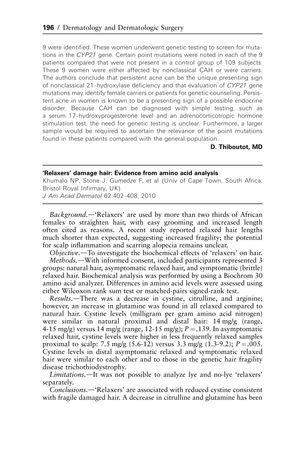Relaxers Damage Hair: Evidence from Amino Acid Analysis
January 2011
in “
Yearbook of Dermatology and Dermatologic Surgery
”

TLDR Hair relaxers are linked to reduced cystine levels and potential hair damage.
The document reports on a study that investigated the biochemical effects of hair relaxers on African females, who commonly use these products to straighten their hair. The study included participants with natural hair, asymptomatic relaxed hair, and symptomatic (brittle) relaxed hair. Biochemical analysis showed a decrease in cystine, citrulline, and arginine, but an increase in glutamine in all relaxed hair compared to natural hair. Specifically, cystine levels were significantly lower in relaxed hair, which is consistent with fragile and damaged hair. The study suggests that the decrease in certain amino acids may be associated with inflammation, and further prospective studies are needed to investigate this potential link. The study had a limitation in that it did not analyze lye and no-lye relaxers separately. The conclusion drawn is that relaxers are associated with reduced cystine and potentially damaged hair, and there is a need for further investigation into whether relaxers induce scalp inflammation.



